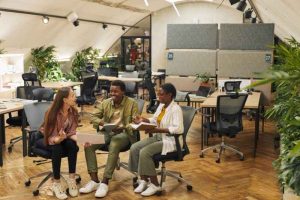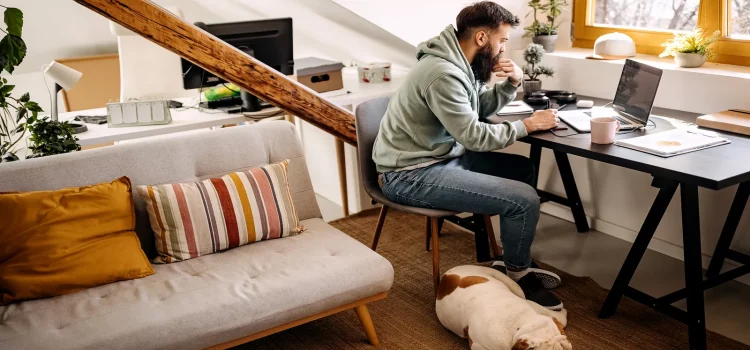
Introduction
The world of work is in the midst of a paradigm shift, and the real estate industry is at the forefront of this transformation. Remote work has emerged as a powerful force, challenging the traditional notions of office spaces and cubicles. In this article, we embark on a journey to uncover how remote work is influencing real estate, ushering in an era of innovation and flexibility in workspace design.
The Remote Work Revolution: Changing the Workspace Landscape
Our journey commences with an exploration of the remote work revolution—a seismic shift that has fundamentally changed the workspace landscape. We delve into the catalysts of this revolution, including advancements in technology, the pursuit of work-life balance, and shifting work preferences.
Adapting Real Estate: Rethinking Workspace Functionality
Real estate faces an adaptive challenge as it reevaluates traditional workspace functionality. The demand for fixed cubicles is diminishing, leading to a reimagination of office spaces. We explore how real estate providers are responding to this challenge, embracing innovative designs and layouts that foster flexibility and collaboration.
Hybrid Work Models: A Blend of Virtual and Physical Spaces
Hybrid work models have emerged as a response to the remote work revolution. These models seamlessly blend virtual and physical workspaces, allowing employees to choose where and how they work. We investigate how organizations are embracing these models, reshaping office spaces to accommodate diverse work arrangements.
Technology-Enhanced Workspaces: The Digital Office Evolution
Technology is the driving force behind the digital evolution of office spaces. We discuss innovations such as smart office solutions, digital collaboration tools, and IoT integration that are transforming offices into tech-savvy, connected environments. These innovations enhance productivity and communication in the modern workplace.
Flexible Workspaces: Meeting the Varied Needs of Remote Workers
Flexible workspace solutions have surged in popularity, catering to the diverse needs of remote workers. We explore the rise of co-working spaces, flexible leasing arrangements, and adaptable designs that empower professionals to choose the work environment that suits them best.
Sustainability and Well-Being: The New Imperatives in Office Design
Modern office design prioritizes sustainability and employee well-being. We delve into eco-friendly practices, wellness-focused features, and sustainable designs that create healthier, environmentally conscious workspaces. These considerations align with the evolving values of remote workers.

Case Studies: Pioneering Real Estate Transformations
Real-world case studies provide tangible examples of real estate transformations in response to remote work. We spotlight companies and organizations that have successfully adapted to this new era, showcasing innovative strategies and approaches that are shaping the future of office spaces.
Expert Perspectives: Shaping the Future of Workspaces
To gain expert insights into the future of workspaces in the age of remote work, we turn to industry leaders, real estate experts, and workplace strategists. Their visionary perspectives illuminate the path forward, offering glimpses of a future where office spaces transcend traditional cubicles and empower professionals to work how and where they excel.
Conclusion
In conclusion, remote work has propelled the real estate industry into uncharted territory. Office spaces are no longer confined to cubicles; they are evolving into flexible, innovative environments. Through hybrid work models, technology integration, flexible solutions, sustainability, and wellness-focused designs, office spaces are adapting and thriving in an era of remote work. This transformation presents opportunities for innovation, adaptation, and a reimagination of workspaces that cater to the diverse needs and preferences of today’s professionals. Whether you’re a real estate professional, a business leader, or simply intrigued by the changing world of work, remember that the influence of remote work on real estate is propelling us beyond cubicles and into a future of limitless possibilities for workspace design.










